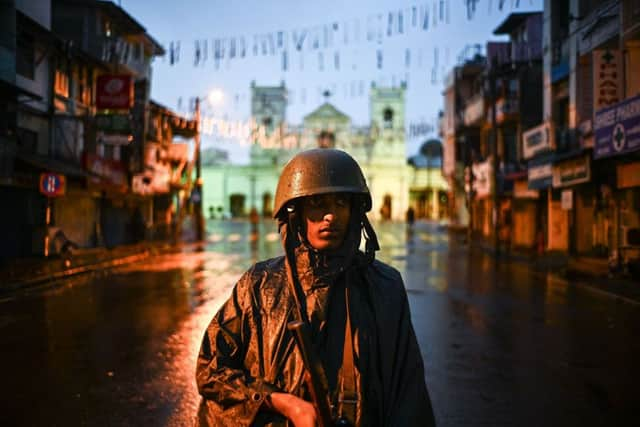Catholic congregations in Sri Lanka told to stay away from church


Cardinal Malcolm Ranjith told journalists that church officials had seen a leaked security document describing Catholic churches and other denominations as a major target for attackers. Cardinal Ranjith, who is archbishop of Colombo, also asked the faithful to stay home for their own safety.
“We don’t want repetitions,” Cardinal Ranjith said.
The cardinal’s comments come after the US embassy in Sri Lanka warned the public to stay away from places of worship over the weekend, a stark alert underlining that authorities believe that members of the group remain at large.
Advertisement
Hide AdAdvertisement
Hide AdThe group’s leader, Mohamed Zahran, killed himself in a suicide bombing at the Shangri-La hotel, one of six hotels and churches targeted in the attacks that killed at least 250 people on Sunday, police said yesterday.
Police also said they had arrested the second-in-command of the group, called National Towheed Jamaat.
For the first time yesterday, Catholic priests allowed journalists inside one of the bombed churches, St Anthony’s Shrine in Colombo.
Broken glass littered the sanctuary’s broken pews and blood stained the floor.
Shoes left behind by panicked worshippers remained in the darkened church. Broken bottles of holy water lay on the floor, where flowers were strewn. Armed soldiers stood guard outside.
Gration Fernando crossed himself when he looked at the church after walking out of his shop nearby. Mr Fernando said he, like other Sri Lankans, is worried about further attacks.
There is “no security, no safety to go to church,” he said. “Now children are scared to go to church.”
Across Colombo, there was a visible increase of security as authorities warned of possible new attacks and pursued suspects who could have access to explosives. Authorities told Muslims to pray at home rather than attend communal Friday prayers – the most important religious service of the week. Several mosques held services despite the warning. At one mosque in Colombo, police armed with assault rifles stood guard outside.
Advertisement
Hide AdAdvertisement
Hide AdAustralia’s prime minister said yesterday that it had been confirmed that the Sri Lanka attackers were supported by the Islamic State group, which has claimed responsibility for the massacre. The group has distributed a video of Zahran and others pledging allegiance to the withered caliphate.
Sri Lankan president Maithripala Sirisena told reporters in Colombo that about 140 people in the island nation had been identified as having links to the Islamic State group, and the Sri Lankan government has the capability “to completely control” IS activities in the country. “We will completely control this and create a free and peaceful environment for people to live,” he said.
Sri Lankan soldiers exchanged gunfire with suspects after attempting to raid a building in the country’s Eastern Province as part of the ongoing investigation into the bomb attacks. Brigadier Sumith Atapattu said a gun battle was under way in the coastal town of Sammanthurai, 200 miles from the capital.
Police also said they arrested the operator of a copper factory who had helped Mohideen make improvised explosive devices and purchase empty cartridges sold by the Sri Lankan military as scrap copper.
Brigadier Sirisena blamed Sri Lanka’s defence secretary, who resigned on Thursday, and police chief, for a failure to share information.
